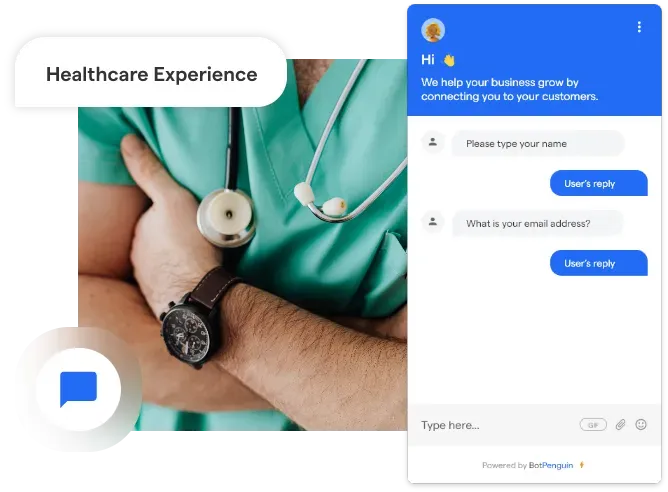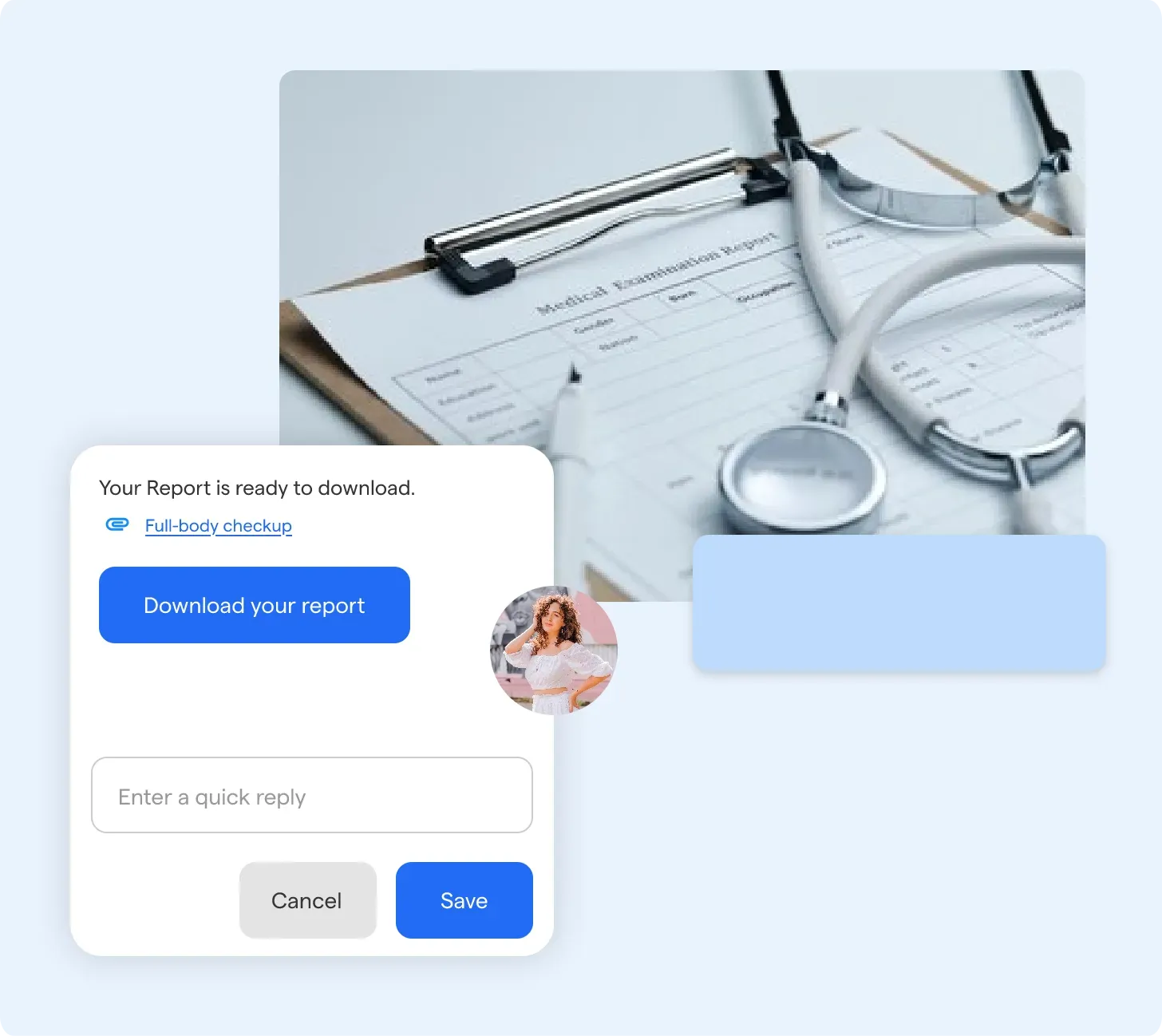Introduction
Healthcare chatbots are rapidly emerging as a transformative technology across the healthcare ecosystem.
Recent projections show the global healthcare chatbot market is on pace to exceed $550 million by 2023 according to Accenture.
This astronomical growth reflects chatbots' immense potential to enhance patient engagement, provider operations, and access to health services.
For patients, chatbots enable 24/7 support that makes obtaining quality care more personalized and convenient. Healthcare chatbots act as always-available resources that can address everyday health questions, provide medication reminders, simplify appointment booking, and support post-care follow-ups.
By automating these repetitive tasks, chatbots create an enhanced, self-service patient experience.
On the provider side, intelligent chatbots unlock new levels of efficiency by taking over high-volume administrative tasks. Healthcare teams can leverage conversational AI to streamline patient intake, process prescription requests, manage referrals and billing, and more. This frees up staff resources to focus on delivering exceptional patient care.
It's evident that AI chatbots have diverse applications throughout the healthcare continuum. So continue reading to know more about the top 5 use cases of Healthcare Chatbots.
What are Healthcare Chatbots?
Healthcare chatbots are like your friendly digital companions in the world of healthcare.

These intelligent healthcare chatbots are designed to interact with users in a conversational manner, providing personalized healthcare services and support.
Why are Healthcare Chatbots Gaining Popularity?
Healthcare chatbots are gaining immense popularity due to their ability to improve healthcare experiences for both patients and providers.
Here are some of the key benefits of healthcare chatbots:
Efficient Patient Engagement
We all know the struggle of scheduling appointments and remembering them. Healthcare chatbots streamline this process by offering automated appointment scheduling and reminders.
By sending timely notifications, they reduce the chances of no-shows, ensuring better patient attendance and engagement.
Improved Access to Healthcare Information
Knowledge is power, and healthcare chatbots act as a 24/7 healthcare resource, providing instant access to reliable information.
One of the benefits of healthcare chatbots is that they can answer common health-related questions, educate users about medications, and even provide general health tips.

Enhanced Healthcare Provider Efficiency
Another benefit of healthcare chatbots includes appointment scheduling and data collection. Chatbots free up healthcare providers' time, allowing them to focus on more critical aspects of patient care.
Additionally, healthcare chatbots integrate with electronic health records (EHR), enabling seamless information exchange and improving the overall efficiency of healthcare systems.
There are many more benefits of healthcare chatbots which make them the number one choice for the healthcare industry!
How Do Healthcare Chatbots Work?
In this section, we’ll see how do healthcare chatbots work:
Natural Language Processing (NLP) and Machine Learning
Healthcare chatbots leverage artificial intelligence to have natural conversations with patients. BotPenguin's healthcare chatbots feel like you're messaging a human, not a robot.
Our advanced NLP and machine learning let bots have natural conversations with patients. The AI analyzes free-form messages to accurately understand needs and questions.
And it continually improves conversational abilities over time. Patients enjoy personalized support from smart bots that talk like real people. Healthcare teams see more efficient, effective patient engagement. BotPenguin is raising the bar for humanized healthcare chatbots.
Suggested Reading:
Appointment Booking chatbot solutions for hospitals by BotPenguin
Integration with Electronic Health Records (EHR)
By integrating with electronic health records, chatbots can access medical history details to provide personalized responses.
Chatbots can simulate human-like empathy and emotional intelligence through advanced AI techniques.
Chatbots can access and retrieve patient information from EHR systems, allowing them to provide personalized recommendations and advice based on individual medical history.
This integration ensures seamless coordination between chatbots and healthcare providers, facilitating efficient and informed decision-making.
Security and Privacy Considerations
When it comes to healthcare, data security and privacy are of utmost importance. Healthcare chatbots prioritize these aspects by adhering to strict regulations and industry standards.
They employ encryption techniques, secure data storage, and user authentication protocols to safeguard sensitive healthcare information. This ensures that your personal health data remains confidential and protected.
Use Cases of Healthcare Chatbots
Whether it's providing personalized recommendations for medication management, symptom assessment, or chronic disease management, these chatbots make healthcare more accessible and convenient than ever before. So lets see the uses cases:
Appointment Scheduling and Reminders: Never Miss a Beat
Missed appointments from forgetting are a healthcare headache. BotPenguin's medical chatbots provide the perfect remedy - automated scheduling with timely reminders.
Patients conveniently find the right time and book appointments via AI chat. Then bots send reminders leading up to visits, so patients never forget.
Healthcare teams leverage effortless appointment management to reduce no-shows and keep patients on track. BotPenguin's chatbots optimize scheduling so patients and providers worry less.
Symptom Assessment and Triage: Your Virtual Medical Advisor
When you're not feeling well, it can be challenging to determine the severity of your symptoms. Chatbots can act as your virtual medical advisor, providing initial medical advice and guidance.
By asking you a series of questions, they can assess your symptoms and provide recommendations on whether you should seek immediate medical attention or try home remedies.
Medication Management and Adherence: Your Personal Pill Pal
Managing medications can be overwhelming, especially if you have multiple prescriptions. Chatbots can help you stay on track by sending reminders for medication intake.
They can also educate you about your medications, including potential side effects and interactions.
With their support, you can ensure that you take your medications as prescribed and avoid any potential complications.
And with BotPenguin you get to serve your patients on the platform they are:
Health Monitoring and Chronic Disease Management: Your Health Companion
For individuals with chronic conditions, managing their health on a daily basis is crucial. Chatbots can assist in this journey by tracking vital signs and health parameters.
They can provide personalized health recommendations based on the data they collect, empowering you to make informed decisions about your health.
With their guidance, you can better manage your chronic condition and improve your overall well-being.
Mental Health Support and Emotional Well-being: Your Virtual Shoulder to Lean On
Taking care of your mental health is just as important as taking care of your physical health.
Chatbots can offer emotional support and counseling, providing a listening ear when you need it the most. They can also provide resources for stress management, self-care, and relaxation techniques.
Conclusion
Healthcare chatbots are rapidly transforming interactions and access to health services through AI-powered, virtual assistants. As discussed, these bots provide 24/7 support for tasks like symptom checking, health advice, appointment bookings, medication management, and counseling.
They create convenient, personalized engagements that improve patient outcomes and experiences.
BotPenguin has been a pioneer in developing conversational AI chatbots for the healthcare industry. Since recent times, they have created chatbots that help patients find doctors, book appointments, understand symptoms, and manage medications.
Their chatbots incorporate natural language processing and machine learning to understand patient questions and provide personalized responses.
By enabling 24/7 access to health information and services, BotPenguin's chatbots are improving patient engagement, reducing costs, and streamlining workflows for healthcare organizations. Their innovative applications of AI are making healthcare more efficient, accessible and human-centric.
Chatbots streamline workflows for both patients and providers with automated, customized services and transform the healthcare industry!
Frequently Asked Questions (FAQs)
What are healthcare chatbots and how do they work?
Healthcare chatbots are AI-powered software programs designed to interact with patients, provide information, and offer support.
They work by using natural language processing and machine learning algorithms to understand and respond to user queries and requests.
What are the top use cases of healthcare chatbots?
The top use cases of healthcare chatbots include appointment scheduling, symptom assessment, medication reminders, patient education, virtual triage, and post-discharge follow-up.
These chatbots enhance patient engagement, improve efficiency, and streamline healthcare processes.
How can healthcare chatbots improve patient care?
Healthcare chatbots can improve patient care by providing 24/7 access to information, support, and guidance.
They can offer personalized recommendations, assist with self-diagnosis, and ensure patients are informed and empowered to make better healthcare decisions.
Are healthcare chatbots secure and compliant with privacy regulations?
Yes, healthcare chatbots prioritize patient privacy and comply with industry regulations such as HIPAA.
They are designed with robust security measures to ensure the confidentiality and integrity of patient data during interactions.
Can healthcare chatbots integrate with existing healthcare systems?
Yes, healthcare chatbots can integrate with existing healthcare systems such as electronic health records (EHR) and appointment scheduling software.
This seamless integration allows chatbots to access and update patient information in real-time, improving coordination and continuity of care.
How can healthcare chatbots benefit healthcare providers?
Healthcare chatbots can benefit providers by reducing administrative burdens, automating repetitive tasks, and freeing up staff time.
They can also improve patient engagement and satisfaction, enhance efficiency, and enable better resource allocation in healthcare organizations.


